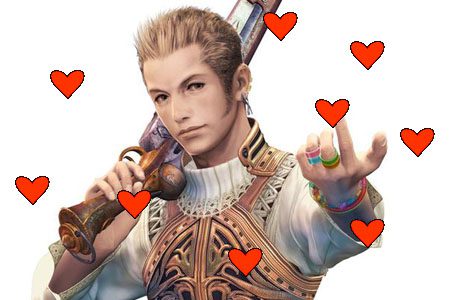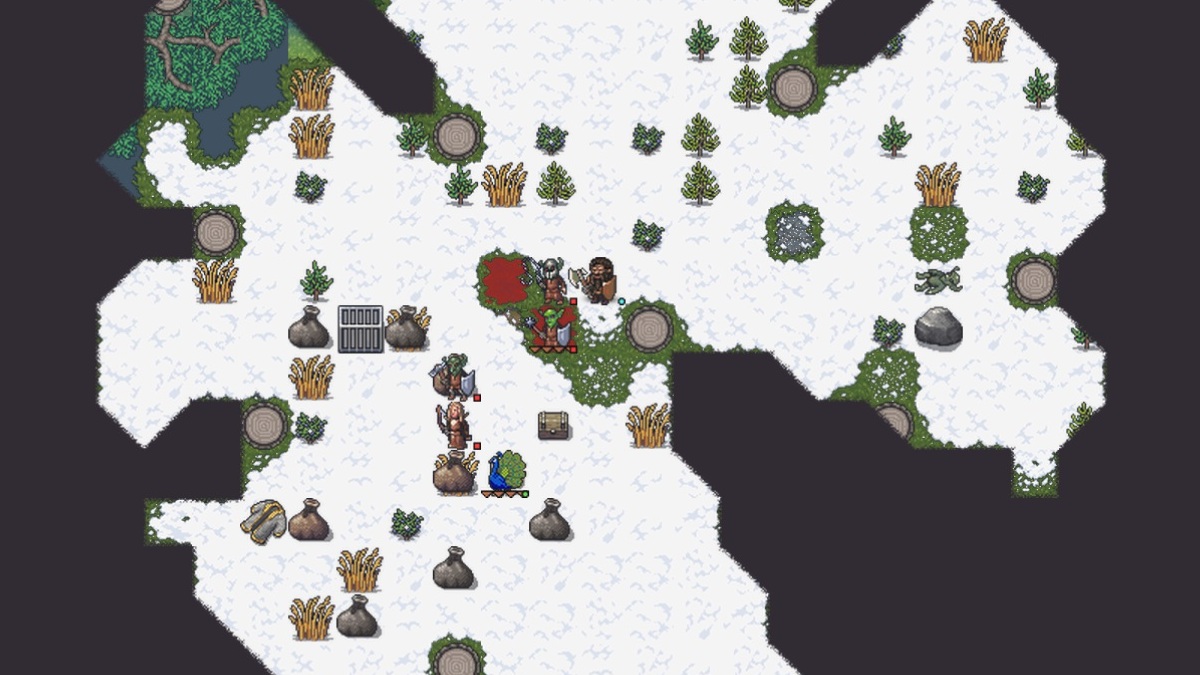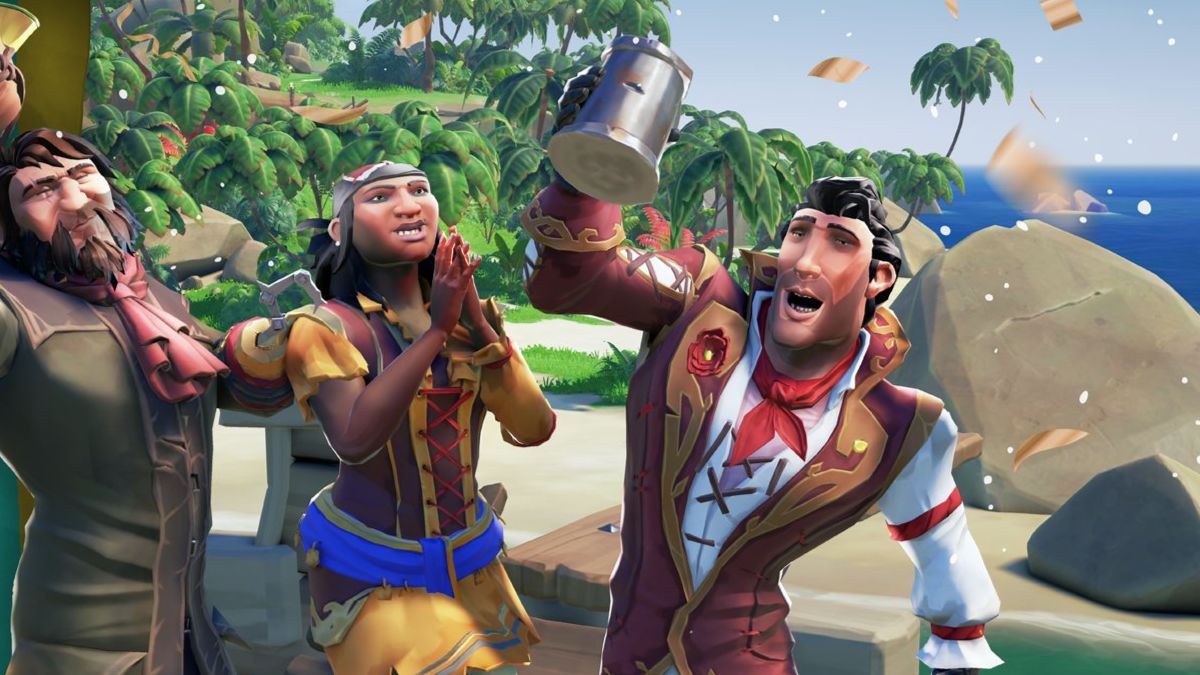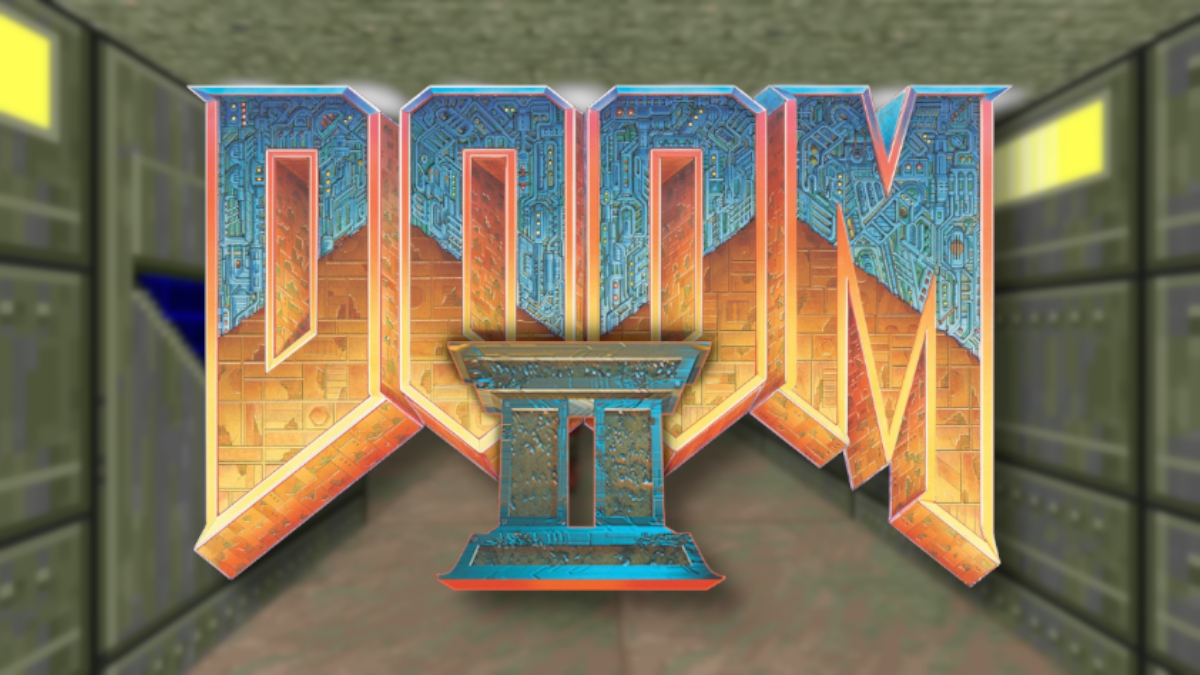I want more heroes like Final Fantasy XII‘s Balthier. No, wait — I want all heroes to be Balthier. Let’s simply replace every character in every game with Balthier and be done with it. No more stoic, angry ex-cons who bench-press and blood-slurp their way through the industrial dystopia. And while we’re at it, no more whining, effeminate introverts who would rather write poems titled “Not My Problem” and “Whatever” in their Livejournals than slay a monster or two.
Balthier doesn’t have time to bitch and moan. Rather, Balthier wants to engage you in an intelligent discussion, loan you 20 bucks, and fix your leaky roof — all the while saving the whole damn world with naught but a snide remark and his trusty side-arm. Balthier is an unmitigated and unparalleled badass, a truly rare occurance in the current climate of video gaming, and the latest and greatest reason for you to doubt your heterosexuality.
There is an ongoing argument levelled by several feminist gaming enthusiast blogs (like Ariel Wetzel’s excellent New Game Plus) that calls shenanigans on the slew of stereotypes working their way into game design, vis a vis what goes as standard for a female character. Lara Croft’s almost a self-parodying figure these days, but her legacy certainly isn’t — slap a hefty rack on an avatar of virtually any variety to increase her appeal by 200%.
I agree entirely with such arguments. Misrepresentation, stereotyping and pandering to the traditionally male market are rampant. So why isn’t anybody getting riled up about poorly-drawn male leads? The characters often sketched as hulking bruisers who drink the blood of babies? The flood of this badass facade made something in me switch off, and I started prioritizing almost every other aspect of game development over a well-written story. I was too tired to give a crap any longer.
Meanwhile, Final Fantasy XII‘s reviews have offered great praise for its story and, specifically, its characters. I found myself setting aside my distaste for the revamped combat system (which, later, proved to be one of the finest RPG battle systems yet created) because I loved the characters. Balthier was especially charming — he shirks the tacked-on conventions that have become typical in videogames in favor of character traits that are truly heroic. He’s optimistic, ethical, intelligent, and extremely likeable — you know, the characteristics that have become almost taboo nowadays. That the appearance of this kind of male lead strikes many as a surprise is something that ought to make you think.
Lately, we’ve witnessed a deluge of character design tailored in response to the drastically simplified heroes of yore. I can’t exactly classify this development as a step forward. In 1988, Data East graced the world with Bad Dudes, in which our heroes Blade and Stryker (holy God, I love those names) were charged with the quest of saving the President, who had been kidnapped by ninjas. Keeping in step with hallmarks of the early arcade era, Blade and Stryker are not given any kind of backstory, and damn it, they didn’t need it. Their qualifications, in broad terms, were that they were bad enough dudes to save the President. A bit limited, but whatever. I’m with you. Let’s go beat up some ninjas.
How has anything changed? Granted, the reigning fad of the day is the dark, stoic, misunderstood loner variety of badass, but doesn’t that make them — well, slightly angrier Bad Dudes? And while developers have met the needs of gamers expecting a solid narrative by incorporating backstory, don’t they all lead to what essentially amounts to the same bone-crushing bastards we’ve seen countless times before? Justifying your carbon-copy hero with a complicated and uninteresting past is a waste of effort. Some of these characters just suck, and giving them weak backstory to excuse their suckiness is downright insulting.
These games are, in a sense, scrambled and rearranged variations on the same 80s Schwarzenegger flick — let us not pretend otherwise. I don’t care how Marcus Fenix became Marcus Fenix, because at the end of the day, he’s just another Master Chief. If the end result is the same character we’ve already played before, let’s just skip the backstory. It’s unnecessary. Let me blow some stuff up.
Development studios are marketing to the Spike TV demographic, and who can blame them? Just as you can make a female character more appealing by ballooning her cup size, so can you tailor a male lead — not with tits, though, that’d be weird. Remember when Ubi-Soft jumped the shark with Prince of Persia: Warrior Within? Same idea. Though Warrior Within was arguably just as much fun as the original, the butt-rock soundtrack and newly revised Prince were huge points of contention amongst fans of the series. One piece of repeated praise for the original Sands of Time was the Prince himself: he was smart, witty, and extremely well-written. He was weaker than he was agile, had a variety of realistic character flaws, and fit well into a game design schema that was not about slaying everyone in sight — at least, not until the sequel. As a component of the game as a whole, he pushed Prince of Persia’s next-gen debut above and beyond what was expected of Ubisoft.
As much as I loved the Prince, I ought to have anticipated Balthier as a sure-fire win for me. His acerbic wit and intelligent dialogue provide an excellent counterbalance to Final Fantasy XII‘s heavy storyline, and his resolve is an uncommon but not unwelcome aid to the plot’s development. Former leads like Squall and Cloud employed convoluted excuses to participate in their journey, and their heroism was pock-marked by the developing fad of angry loner characters. Bitch, bitch, bitch.
The men of video games have been pigeonholed into roles that require intelligence at the cost of common sense, or strength at the cost of intelligence. Similar to the hard-wired dichotomy in gaming of girls with huge knockers or no girls at all, the scope of male characters is limited to a handful of archetypes, each more boring than the next. Final Fantasy XII is a step in the right direction, not only for console RPGs but for console gaming in general. The lesson is simple: before slogging your characters through a convoluted backstory, be certain they’re worthy of having one.
I’m all for flushing out the Lara Crofts of the gaming world so long as we rid ourselves of the 300 pound retards who could play golf with their bits and pieces but fail a 3rd grade spelling test while we’re at it. They make for fine filler, but take heed, developers: they don’t all have to be this way. There ain’t nothing wrong with wanting a lead that can kick ass, behave with some modicum of common sense, and be heroic without being a jerk. There ain’t nothing wrong with wanting heroes to act like heroes. And perhaps most importantly, making your lead character conflicted does not make your story deep. Let’s not shit ourselves.




